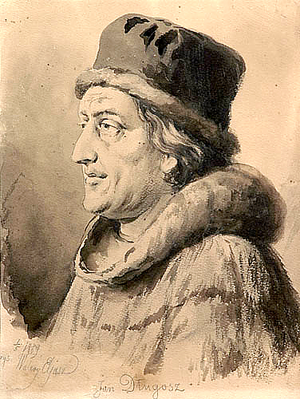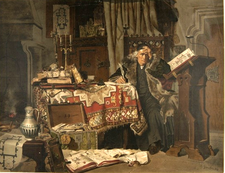- Jan Długosz
-
Jan Długosz
Jan DługoszFull name Jan Długosz Other names Joannes, Ioannes, Johannes Longinus, Dlugossius Born December 1, 1415
Stara Brzeźnica, PolandDied May 19, 1480 (aged 64)
Kraków, PolandEra 15th century Region Poland Major works Annales seu cronici incliti regni Poloniae Jan Długosz (1 December 1415, Stara Brzeźnica – 19 May 1480, Kraków; also known as Joannes, Ioannes or Johannes Longinus or Dlugossius) was a Polish priest, chronicler, diplomat, soldier, and secretary to Bishop Zbigniew Oleśnicki of Kraków.
Contents
Life
Jan Długosz is best known for his Annales seu cronici incliti regni Poloniae (The Annals of Jan Długosz), covering events in southeastern Europe, but also in Western Europe, from 965 to 1480, the year he died.[1] His work was first printed in 1701-1703. Whenever he bothers to mention himself in the book, he writes of himself in the third person. He belonged to the Wieniawa coat-of-arms.
Długosz was a canon at Kraków, educated in the University of Krakow. He was sent by King Casimir IV Jagiellon of Poland on diplomatic missions to the Papal and Imperial courts, and was involved in the King's negotiations with the Teutonic Knights during the Thirteen Years' War (1454–66) and at the peace negotiations.
In 1434, Długosz's uncle, the first pastor at Klobuck, appointed him to take over his position as canon of St. Martin church at Klobuck. The town was in the Opole territory of Silesia, but had recently been conquered by Władysław II Jagiełło. Długosz stayed until 1452 and while there, founded the canonical monastery.
In 1450, Długosz was sent by Queen Sophia of Halshany and King Casimir to conduct peace negotiations between John Hunyadi and the Bohemian noble Jan Jiskra of Brandys, and after six days' of talks convinced them to sign a truce.
In 1455 in Kraków, a fire spread which destroyed much of the city and the castle, but which spared Długosz's house.
In 1461 a Polish delegation which included Długosz met with emissaries of George of Podebrady in Beuthen (Bytom), Silesia. After six days of talks, they concluded an alliance between the two factions. In 1466 Długosz was sent to the legate of Breslau (Wrocław), Silesia in order to attempt to obtain assurance that the legate was not biased in favor of the Teutonic Knights. He was successful, and was in 1467 entrusted with tutoring the king's son.
Długosz declined the offer of the Archbishopric of Prague, but shortly before his death was elected Archbishop of Lwów.
His work Banderia Prutenorum of 1448 is his description of the 1410 Battle of Tannenberg, which took place in the Prussian villages Grünfelde near Tannenberg. Dlugosz described the town wrongly as Grunwald. (After the 1945 conquest by Soviet Union and Poland Grünfelde was renamed Grunwald and Tannenberg was renamed Stębark.)
At some point in his life Dlugosz loosely translated Wigand of Marburg's Chronica nova Prutenica from Middle High German into Latin, however also with many mistakes and mixup of names and places.[2]
Works
- Annales seu cronicae incliti Regni Poloniae (Annals or Chronicles of the Famous Kingdom of Poland)
- Roczniki, czyli kroniki sławnego Królestwa Polskiego (new Polish translation of the Annals, 1961–2006)
- The Annals of Jan Dlugosz (English translation of key sections of the work, ISBN 1901019004)
- Historiae Polonicae libri xii (Polish Histories, in Twelve Books; written 1455–80; first published 1711-12, in 2 volumes)
- Banderia Prutenorum, flag book, completed in or shortly after 1448, when Stanislaw Durink painted the illuminations.
See also
Notes
- ^ "Jan Dlugosz". Catholic Encyclopedia. http://www.newadvent.org/cathen/05069b.htm.
- ^ Samples of Jan Dlugosz mistakes and mixups on Pages 431-434 in Scriptorum Rerum Prussicarum
External links
- Liber beneficiorum ecclesiae Cracoviensis ("Book of the Benefices of the Bishopric of Krakow") At the National Digital Library of Poland
Religious titles Preceded by
Grzegorz z SanokaArchbishop of Lwów
1480Succeeded by
Jan StrzeleckiCategories:- 1415 births
- 1480 deaths
- People from Pajęczno County
- Polish historians
- Diplomats of the Polish–Lithuanian Commonwealth
- Polish bishops
- Canons of Kraków
- 15th-century Roman Catholic archbishops
- Archbishops of Lwów
- Chroniclers
- Chronicles regarding Lithuania
- 15th-century historians
- Alumni of Jagiellonian University
Wikimedia Foundation. 2010.



